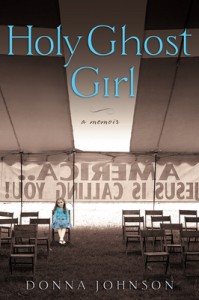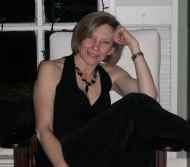 Synopsis:
Synopsis:
Donna was a mere three years old and her younger brother, Gary, was barely a year old when their divorced mother left her parents’ home to travel the country with evangelist David Terrell during the 1960’s. Her children in tow, Carolyn and the other members of Terrell’s tent ministry staff moved from town to town holding revivals under a large tent. Night after night, Donna and Gary, along with Terrell’s children, Randall and Pam, watched as “Brother Terrell” paced the stage preaching, singing, praying, speaking in tongues, exorcisms, and whipping himself and his audiences into emotional frenzies that resulted in miraculous healings — and full offering buckets.
As the local revivals would draw to a close, the children would fall asleep as the caravan rolled on to the next town, awaking in a new, strange place where their temporary living arrangements would be revealed to them. As the crew erected the enormous tent and platform stage, they played. But when it was time for the prayer meeting to begin, they were required to dress properly and sit quietly with whatever female adult had been charged with their supervision as they watched their mother onstage, pounding out rousing gospel hymns on the Hammond organ.
As Donna matured, she came to understand that what went on under the big tent was only one aspect of their nomadic lifestyle. Behind the scenes, she learned about the sordid, scandalous events that shaped her future, as well as that of her mother and brother. Frequently abandoned by their mother to abusive caregivers for long stretches of time, Donna and Gary were drawn, along with their mother, into Terrell’s complicated web of lies and deception. As Terrell grew more prosperous, they were lifted out of poverty into more comfortable living conditions, but at what cost?
Review:

In the days before evangelists discovered their message could efficiently reach vast television audiences, they traveled the country holding revivals that lasted a few or many consecutive evenings. Usually sponsored by local congregations, a large tent would be erected and crowds — largely unsegregated — poured in to hear the Gospel. The services concluded with an “altar call,” the moment when the preacher invited nonbelievers to come forward, kneel, pray, and be transformed into believers.
Much of Johnson’s memoir is not merely cringe-worthy. It is heartbreaking, particularly when she describes the time that their mother left her and Gary — both of them still too young to begin elementary school — in the care of strangers so that she could travel with Terrell, unencumbered by her small children. Johnson gradually begins questioning her mother’s relationship with Terrell. In the backseat of Terrell’s car with her mother and brother, no one realizes that she is awake as Terrell drives through the night to the tent ministry’s next scheduled stop with his wife and daughter on the front seat with him. “A hand made its way from the front seat to the back and rested, light and tentative as a mayfly, on my mother’s knee. Someone flicked on an overhead light.” If not already suspicious of Terrell and his entourage, Johnson ensures that her readers understand from that point on that all was not how it appeared on the surface.
In fact, although Terrell was married, he carried on a long-term relationship with Johnson’s mother who instructed her children to introduce him to neighbors as their Uncle David, their mother’s favorite brother. After awhile, Terrell and her mother dropped the pretense that Terrell was sleeping on the living room couch while staying with them.
Understandably, the young Johnson cannot reconcile Terrell’s preaching against sins that include adultery and lust with the behavior she observes which serves to further complicate an already confusing childhood. In that fundamentalist, Pentecostal environment, Johnson was not allowed to wear pants or watch television. Her only friends were Terrell’s children. Ironically, they referred to other children they met as the “outsiders.”
Johnson describes terrifying encounters with the Ku Klux Klan because of Terrell’s initial refusal to segregate his audiences. She also recounts the time she and Gary spent with two African-American women, during which they endured boldly escalating night-time attacks from racists, culminating in their departure from the neighborhood as they watched the events following the assassination of President John Kennedy on television. She also describes the torture she survived while left with more than one unscrupulous babysitter.
Two aspects of Johnson’s account of her childhood are quite remarkable. First, she relates the events in a matter-of-fact, almost detached manner that is completely devoid of overwrought emotion or self-pity. But her descriptions of life as a self-described “holly roller” child are eloquent and vivid. Secondly, her lack of vitriol or resentment is astonishing. Overall, she is forgiving almost to the point of ambivalence not only toward her mother and Terrell, but also about the cult-like religion that took such an incredible toll on her and her siblings. Terrell eventually sold himself as not just a preacher, but a prophet who foretold the end of the world. “Terrellites” began swarming to his compound to await their last day on earth, even as the Internal Revenue Service was closing in on him for his years-long failure to pay income tax on all the “love offerings” — cash stuffed into Terrell’s hands and pockets in the early days, or into the apron with huge pockets that took to wearing later — he collected from followers over the years. Johnson condemns none of the adults who made her childhood so highly atypical and frequently tragic. She eventually turned away from religion, marrying for the first time at sixteen in order to break away from her mother, Terrell, and their circus-like existence. Conclusions still evade her. “Sifted and shaped over time by the adults around me, my recollections have distilled into a mythology of faith, hard to believe, harder still to deny,” she admits. She describes the last time she saw Terrell, who was by then an ex-convict, old and stooped over, at Randall’s funeral.
I had spent a lifetime deciding, and each time I thought I knew, the answer proved too small to encompass my experience. Or was it the question? Maybe it wasn’t about Brother Terrell, but two worlds: one under the tent and the other outside. Each time I turned toward one, I turned away from some part of myself. . . . After all this time. It wasn’t belief or unbelief. It was love. It could not have been otherwise. I stood and as I did, I saw the old man and woman framed in the doorway of the church. Beyond them stretched the beginning of the west Texas sky, and the world, the big, wide world. I’d be there again soon enough. I left my seat and took my place in line, and when it was my turn, I took his hand and told him I loved him.
Today Johnson describes herself as having thrown off her Holy Ghost Girl persona. Now she is a “‘luke warm’ Christian, a wishy-washy Episcopalian” who no longer attends church regularly, despite her love of its rituals. Rather than participate in hours-long prayers such as those she experienced under the tent, she says she prays by sitting “in silence in what Christians calls contemplative prayer and others call meditation. It’s an active listening and waiting, and it’s a powerful form of prayers. When I was a kid, people often said prayer changes things. Sitting in silence changes me, and that may be the most astounding miracle of all.” So perhaps her profession of sustaining faith and belief in prayer is, when all is said and done, the most surprising aspect of Johnson’s surreal story. Readers who enjoy memoirs will find themselves thoroughly engrossed in and riveted by Holy Ghost Girl.



26 Comments
This looks like a fascinating book!
I love the sound of this book – would love to win.
This one sure sounds good!
Thanks for the giveaway!
I find this whole topic fascinating. Thanks for the giveaway.
I’d like to see how this lifestyle influenced the author as a small child. Sounds very interesting. Thanks for the giveaway.
I HAVE to have this book. (lol) Knowing it is a memoir makes it even more important to read. The world looks so different from the eyes of a child.
Great review.
Thank you for this awesome giveaway. I loved your review and this book sounds amazing!
– Beckie
ChiKittie(at)gmail(dot)com
The complete aspect of the writer’s story appeals to me. I do not read as many true stories as I would like. They make me so sad usually to know what goes on out in the world.
Judy
magnolias_1[at]msn[dot]com
I love memoirs and this one sounds like a good match to my tastes. 😀
This sounds like a fascinating and at times disturbing story about Donna growing up with evangelist David Terrell..The Prologue is certainly attention-grabbing! This is a memoir I really want to read, especially knowing that Johnson’s doing okay now!
Thank you for this giveaway!
Aimala127(at)gmail(dot)com
I love the book’s title and the plot 🙂
I’ve always been interested in how people get swept up in a religious frenzy and follow these evangelists around.
the things that actually go on behind the scene of religion and peoples beliefs
My husband and I go to many revivals and I’d love to read a “behind the scenes” account of what that life can be like.
My mother’s parents were split on religion. My grandmother like to stay home and pray quietly and my grandfather was a “holy roller”. I have seen a documentary film about holy rollers but I would like to learn more.
Thank you for the giveaway of this very interesting book.
CarolNWong(at)aol(dot)com
As far as what aspect makes me want to read it, it is just to learn more behind the scenes and in general about the holy rollers.
I want to see what the children thought and felt.
I like the time setting the most. Such a time of change and resistance as well.
I get really worked out about these evangelists. I would truly love to read this memoir. Thanks for the chance.
dianad8008 AT gmail DOT com
This looks fascinating and riveting. I would love to read it. I live in a very small town where tent revivals still take place. I have always wondered what happens in those tents.
Pingback: Donna M. Johnson, author of Holy Ghost Girl: A Memoir, on tour October 2011 | TLC Book Tours
The fact that the author can write without severe negativity is quite an accomplishment in my mind. I’m glad that you found the book readable and well-written. Thanks for being on the tour.
Pingback: Life in Review: “Holy Ghost Girl” by Donna Johnson « Life In Review
I like memoirs and this one sounds good.
I have never read about the traveling ministry’s lifestyle from a children’s point of view. I think this would be very interesting.
I love true stories of the 60’s